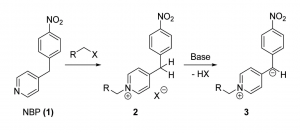We know that anticancer drugs have severe side effects on patients, but have you ever wondered if healthcare workers are being affected too?
A recent study has found that 60% of hospital pharmacies contain high levels of toxic drugs and that 20% of BC healthcare workers were found with unsafe levels of cyclophosphamide (CP). CP is a chemotherapy medication that has side effects, such as hair loss, low blood cell counts and can be as severe as low infertility and increased risk of developing cancer.
Dr. Love’s research group at the University of British Columbia have synthesized derivatives of 4-(4-Nitrobenzyl)Pyridine (NBP). These derivatives serve as an effective DNA model because they have very similar reactivity as DNA to toxic alkylating agents, which are active pharmaceutical ingredients mostly found as anticancer drugs.

Figure 1: the reaction of NBP with alkylating agent and then the addition of base. Source: JOC
To make the mechanism in figure 1 faster and more applicable, the researchers have developed a more acidic carbonyl derivative of NBP. They have incorporated this carbonyl derivative into a silica polymer to facilitate the deprotonation of the compound, and therefore, detect it with UV-visible spectroscopy to determine the amount of alkylating agent present.

Figure 2: The carbonyl NBP derivative before and after Methyl iodide (alkylating agent) exposure. Source: JOC
They found that this solid-state detector changes colour from white to purple when it detects toxic alkylating agents. For this reason, healthcare workers who are exposed to these anticancer drugs can use this sensor in a badge dosimeter, which allows them to monitor their exposure to alkylating agents.
I think this work is a turning point for a safer work environment. Exposure to unsafe levels of toxic anticancer drugs is not only limited to doctors and pharmacists, but it also affects a wide range of workers involved in drug transportation and administration. I think this paper shows that we are underestimating the number of healthcare workers that are in danger of anti-cancer drugs.
Renad Aldebasi
